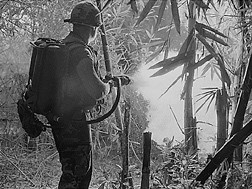
The Legacy of Vietnam: Learning the Lessons of War 2000
Distributed by Films for the Humanities and Sciences, P.O. Box 2053, Princeton, NJ 08543-2053; 800-257-5126
Produced by News Hour with Jim Lehrer
Director n/a
VHS, color, 42 min.
Adult
History
Date Entered: 11/09/2018
Reviewed by Cliff Glaviano, Coordinator of Cataloging, Bowling Green State University Libraries, Bowling Green, OHThis video is compiled from a number of Newshour programs broadcast in April and May of 2000. It begins with an excellent overview of American involvement in Southeast Asia from early involvement during the Eisenhower administration through the Nixon administration and the fall of Saigon. . Through careful editing and voiceover commentary this overview takes care to point out changes in American society, political infrastructure, and television journalism from the beginning of American involvement to the present.
The overview is followed by a rather mediocre panel discussion of the legacy of the Vietnamese conflict with Ray Suarez and panelists Ruth Rosen, Rep. Bobby Rush, Rev. Jim Wallis, Haynes Johnson and David Horowitz. Many of the panelists actively protested U.S. involvement in the war during the 1960’s and ‘70’s and it’s clear that differences in ideologies between various protest factions remain yet today.
Following the panel, Elizabeth Farnsworth revisits the village of Binh Phu, Vietnam, on which she originally reported in 1990, during ceremonies recognizing it as a “Village of Heroes” for the part it played in the wars with the French and the Americans. Binh Phu was a Viet Cong headquarters village during the American war and recently regained its pre-war population of 4,000 having suffered about 35% casualties in repeated encounters with the American military machine during the American phase of the war.
There appears to have been much more on the Vietnam conflict offered on Newshour during 2000 than the distributor chose to include in this video. It is hoped that more of the content could be edited into one or more equally interesting videos with a somewhat different focus. As far as this offering, it fails to fulfill its promise of establishing the “legacy” of the conflict or the “lessons” learned, leaving the viewer unsatisfied. A mature audience will be well aware that the war was, and continued to be, socially divisive (at least until the occurrences of September 11th) as well as the concept of American reluctance to commit to ground warfare when any other means of conflict might serve its aims, such as the bombing in Bosnia and our strategic support for forces opposing the Taliban in Afghanistan. In the former, our detached, no casualty bombing prolonged a period of genocide against the citizenry. The latter’s outcome has yet to be determined. Further “lessons” are left unspecified.
The Legacy of Vietnam tells us part of the story it promises and hints at being able to deliver - a balanced assessment of the lessons of the Vietnamese conflict for the United States. Cynically, the lessons for those in Binh Phu are clear: to the victors belong the spoils, and life returns to normal for those not fully at odds with the current regime. Still, this video contains a good overview of American involvement in Vietnam that easily can be shown in a class period, discussed in another. The clear ideological conflicts remaining over the war evidenced in Ray Suarez’s panel could spark considerable discussion and should provide some insights in sharp contrast to the American social atmosphere following the recent terrorist attacks. Recommended.